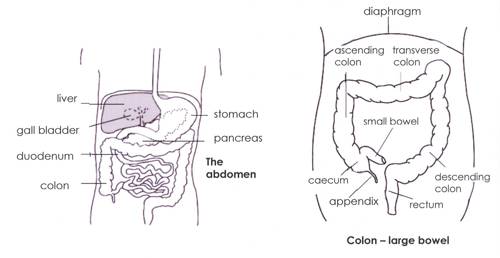After your open operations - at home
You are likely to feel very tired and need rests two or three times a day for a month or more. You will gradually improve so that after three months you will be able to return to your usual level of activity. At first discomfort in the wound will stop you from harming yourself by lifting heavy things. After three months you can lift as much as you used to lift before your operation.
You can drive as soon as you can make an emergency stop without discomfort in the wound. This should be after about six to eight weeks.
You can restart sexual relations within three to four weeks when the wound is comfortable enough. There may be some damage to the sex nerves after this operation. Some studies suggest that it happens in up to 50% of cases. The surgeon will talk to you about this.
You should be able to go back to a light job within eight weeks. Some heavy jobs may not be suitable because of the colostomy.
After keyhole Operation - at home
After keyhole surgery the recovery time is much quicker than with the open operation. But caution still should be paid to heavy lifting and driving.
Possible complications
As with any operation under general anaesthetic, there is a very small risk of complications to your heart and lungs. The tests that you will have before the operation will make sure that you can have the operation in the safest possible way. This brings the risk for such complications very close to zero.
This is a major operation and complications can happen more often compared with other operations of the bowel. When they do happen, they are quickly recognised and dealt with by surgical staff. If you think that all is not well, please let the doctors or nurses know.
You may get a chest infection, particularly if you smoke. To prevent chest infections it is important to:
- get out of bed as soon as possible
- get as mobile as possible
- co-operate with the physiotherapists to clear the air passages
- The bowel can be slow to start working again and this may take several days
- There can be some discharge from the drain by the wound, but this stops given time.
Wound infection happens more often in any bowel operation compared to other 'clean' operations such as taking out your gallbladder. The reason is that the bowel has many bugs that can cause an infection. This settles down with antibiotics in a week of two.
Very rarely, during the operation, another part of the bowel, bladder or a blood vessel can be damaged. Another operation may be needed to deal with this.
Complications of the stoma are:
- a skin rash
- infection or abscess (a pool of pus) around the stoma
- narrowing, stricture or necrosis (tissue death) of the bowel at or near to the stoma
- a hernia of the colostomy, where the bowel falls through the skin
- These complications happen in 4 to 30% of cases. If you get any of these it is likely that you will need another operation to fix the problem.
You may also have:
- aches and twinges in the wound for up to six months
- slow healing of the lower wound
- trouble with the stoma
- some damage to the bladder and sex nerves


